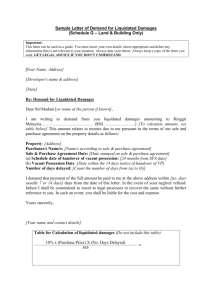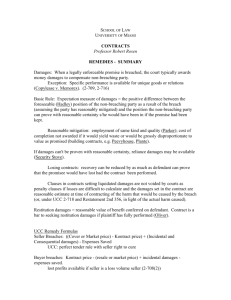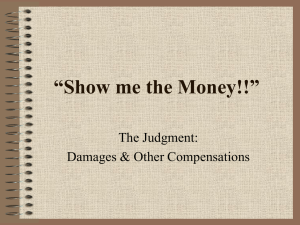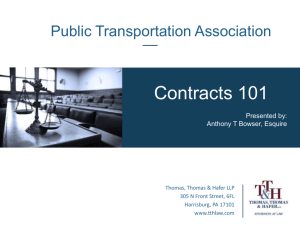Document
advertisement
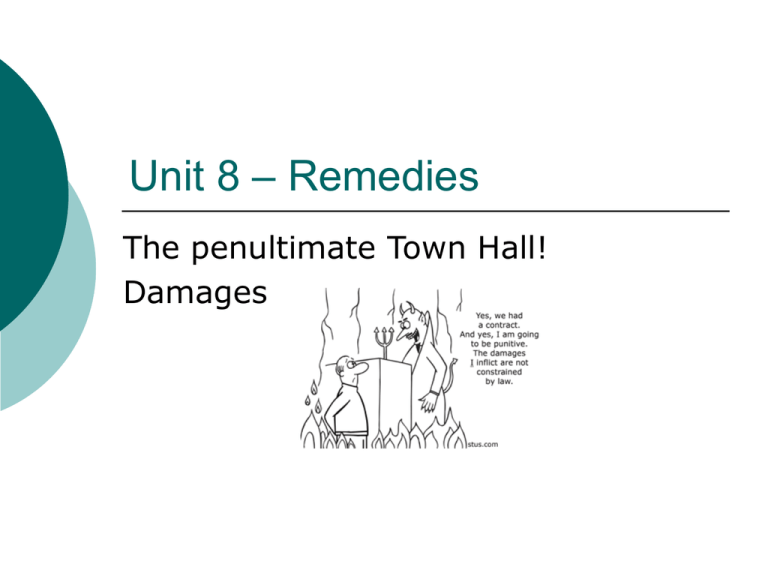
Unit 8 – Remedies The penultimate Town Hall! Damages Two Types of Remedies Monetary – Suits “at law” Equitable – Suits “in equity” Types of Monetary Damages Compensatory Punitive Nominal Consequential Liquidated Damages 5 Rules for Compensatory Damage Damages must be “foreseeable” Parties must understand that damages follow a breach Damages must be specific Mitigation Damages should not exceed total of contract Punitive Damages Rarely used in contract cases Why do you think? Nominal Damages Why would the court award $1 to a Plaintiff? Consequential Damages Can include damage that occurred as a result of the breach. Liquidated Damages A provision in the contract that limits certain types of damages in the event of a breach. UCC addresses liquidated damages as well. UCC 2-718 § 2-718. Liquidation or Limitation of Damages; Deposits. (1) Damages for breach by either party may be liquidated in the agreement but only at an amount which is reasonable in the light of the anticipated or actual harm caused by the breach, the difficulties of proof of loss, and the inconvenience or nonfeasibility of otherwise obtaining an adequate remedy. A term fixing unreasonably large liquidated damages is void as a penalty. (2) Where the seller justifiably withholds delivery of goods because of the buyer's breach, the buyer is entitled to restitution of any amount by which the sum of his payments exceeds (a) the amount to which the seller is entitled by virtue of terms liquidating the seller's damages in accordance with subsection (1), or (b) in the absence of such terms, twenty per cent of the value of the total performance for which the buyer is obligated under the contract or $500, whichever is smaller. (3) The buyer's right to restitution under subsection (2) is subject to offset to the extent that the seller establishes (a) a right to recover damages under the provisions of this Article other than subsection (1), and (b) the amount or value of any benefits received by the buyer directly or indirectly by reason of the contract. (4) Where a seller has received payment in goods their reasonable value or the proceeds of their resale shall be treated as payments for the purposes of subsection (2); but if the seller has notice of the buyer's breach before reselling goods received in part performance, his resale is subject to the conditions laid down in this Article on resale by an aggrieved seller (Section 2-706). Equitable Relief When money just won’t do it… How do you get equitable relief? It’s not easy. You have to show that: There is no adequate remedy at law There will be irreparable harm The contract is valid The contract is clear and unambiguous The plaintiff has “clean hands” Types of Equitable Relief Injunction Specific Performance Reformation – only if a mistake in the contract Recission – usually only in the event of fraud or undue influence Assignment In our townhall this week we will consider the case of: DeMoss v. Conart Motor Co. 72 N.E. 2d 158 (Ohio 1947). What was the remedy awarded to the plaintiff? Could the time period in which this case was brought have anything to do with the type of damages awarded? If you ordered a car today, and the dealer breached the contract, would your damages likely be like those in the DeMoss case? Why or why not?
